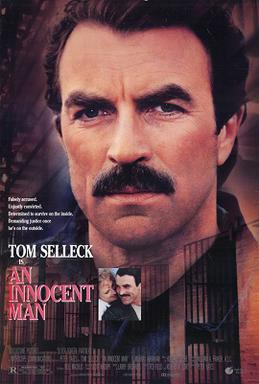 Jimmie Rainwood (Tom Selleck) is an aeronautics engineer who, with the exception of once getting arrested for marijuana possession in college, has lived a clean and productive life. Mike Parnell (David Rasche) is a corrupt narcotics detective with a raging coke habit. When Parnell and his partner, Scalise (Richard Young), get a tip about a house where drugs are hidden, Parnell is so coked up that he gets the address wrong. They end up breaking into Jimmie’s house and, when Jimmie steps out of the bathroom holding a hair dryer, Saclise shoots him.
Jimmie Rainwood (Tom Selleck) is an aeronautics engineer who, with the exception of once getting arrested for marijuana possession in college, has lived a clean and productive life. Mike Parnell (David Rasche) is a corrupt narcotics detective with a raging coke habit. When Parnell and his partner, Scalise (Richard Young), get a tip about a house where drugs are hidden, Parnell is so coked up that he gets the address wrong. They end up breaking into Jimmie’s house and, when Jimmie steps out of the bathroom holding a hair dryer, Saclise shoots him.
Jimmie survives getting shot but that’s the least of his problems. In order to cover up their mistake, Parnell and Scalise frame Jimmie. They replace the hair dryer with a gun. They plant drugs in Jimmie’s house. Because of his previous marijuana conviction, no one believes Jimmie when he says he was set up. Convicted of a crime that he didn’t commit, Jimmie is sentenced to six years in prison. While his wife (Laila Robins) does everything that she can to get him released, Jimmie is preyed upon by the other prisoners. His only friend is Virgil (F. Murray Abraham), a veteran prisoner who shows Jimmie that he’s going to have to do some terrible things to survive being in prison.
As he showed when he directed Bullitt, the late Peter Yates was a director who could make even the most conventional genre material feel fresh and that is what he did with An Innocent Man. Made at a time when American leaders bragged about their devotion to the war on drugs, An Innocent Man is critical of both the police and a legal system that cares more about punishment than rehabilitation. Even if the plot is predictable, the film is gritty enough to make an impression. Jimmie is so victimized and Parnell and Scalise are so smug that, by the time Jimmie finally has a chance to orchestrate his revenge, you can’t wait to see the cops get what’s coming to them.
Part of the appeal of An Innocent Man is that it features actors who you normally would not expect to appear in a film like this. Tom Selleck, best-known for playing upright authority figures, plays a frightened man who is forced to sacrifice his humanity to survive. When the movie started, I was skeptical that Selleck could pull off the role but, by the end of the film, he had the thousand-yard stare of a man who had been to Hell and back. Meanwhile, David Rasche, best known for his work in sitcoms, is more than convincing as the most corrupt narc around. Best of all is F. Murray Abraham, playing the seasoned convict who knows how to get things done in prison. When he tells Jimmie that he has to “take of care of this,” even if it means committing a real crime, you believe him. By the end of An Innocent Man, nobody’s innocent anymore.